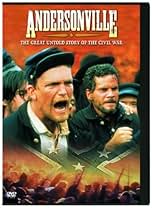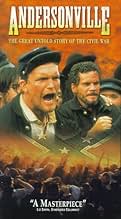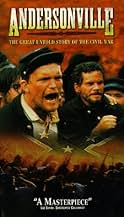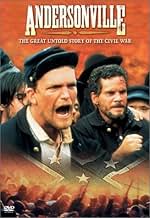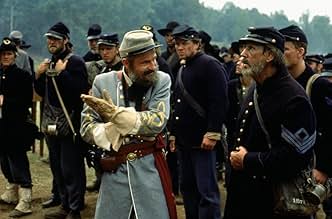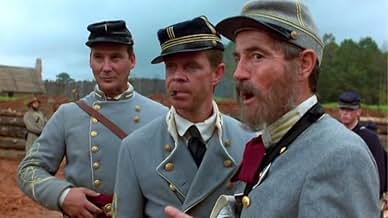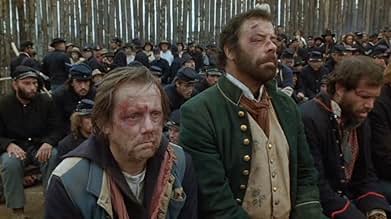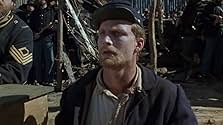IMDb RATING
7.3/10
2.2K
YOUR RATING
The story of the most notorious Confederate prisoner of war camp in the American Civil War.The story of the most notorious Confederate prisoner of war camp in the American Civil War.The story of the most notorious Confederate prisoner of war camp in the American Civil War.
- Won 1 Primetime Emmy
- 3 wins & 10 nominations total
Browse episodes
7.32.2K
1
2
3
4
5
6
7
8
9
10
Featured reviews
And what do you call this little piece of heaven?
The American Civil War, and Union soldiers are imprisoned at Andersonville, a crude stockade establishment presided over by the inept and cruel Captain Henry Wirz. It would prove to be a another dark and soul destroying chapter from the war.
Lets get it out there right away, Andersonville was not the only hell hole prison operating during the American Civil War. Information from both sides of the coin is available on line for those wishing to explore further. That said, Andersonville is a story that deserved and is needed to be told, and this John Frankenheimer directed two - parter brings it vividly into the viewers' lives.
In filmic substance terms it has all the standard POW movie cliche's. We follow a group of prisoners and a group of "convict bullies", with those in authority observing menacingly and proving desperately carefree as to the conditions of the prison and of humane traits in general.
But as formulaic as it ultimately is, there's a determination by the makers to keep the characterisations real and viable, and they achieve this in spades. Pic is also boosted by superb period detail, costuming is grade "A", while the production and art design for the prison is harrowingly effective.
Frankenheimer's tracking shots brings home the enormity of the misery, while Gary Chang's score is thankfully never bombastic. Cast are a mixed bag - to be expected in such a large ensemble piece - and you can't help but yearn for more of William H. Macy.
Yet even though 30 minutes could easily have been shaved off of the run time, Andersonville is a production that should stay with you. The coda serving to remind us that that should be the case. 7/10
Lets get it out there right away, Andersonville was not the only hell hole prison operating during the American Civil War. Information from both sides of the coin is available on line for those wishing to explore further. That said, Andersonville is a story that deserved and is needed to be told, and this John Frankenheimer directed two - parter brings it vividly into the viewers' lives.
In filmic substance terms it has all the standard POW movie cliche's. We follow a group of prisoners and a group of "convict bullies", with those in authority observing menacingly and proving desperately carefree as to the conditions of the prison and of humane traits in general.
But as formulaic as it ultimately is, there's a determination by the makers to keep the characterisations real and viable, and they achieve this in spades. Pic is also boosted by superb period detail, costuming is grade "A", while the production and art design for the prison is harrowingly effective.
Frankenheimer's tracking shots brings home the enormity of the misery, while Gary Chang's score is thankfully never bombastic. Cast are a mixed bag - to be expected in such a large ensemble piece - and you can't help but yearn for more of William H. Macy.
Yet even though 30 minutes could easily have been shaved off of the run time, Andersonville is a production that should stay with you. The coda serving to remind us that that should be the case. 7/10
Life In Hell
This is a sobering, if perhaps a bit too long, recreation of life in the notorious Confederate Camp Sumter (better known as Andersonville after the neighbouring community) which housed almost 50000 Union prisoners of war during the last year and a half of the Civil War. I found it difficult to determine from what perspective the story was being told - which perhaps makes it a fairly balanced movie. There's no doubt that the Confederate guards were portrayed as ruthless, and that Captain Henry Wirtz, the Camp's commander, was portrayed as both ruthless and perhaps a bit insane, but the bulk of the movie really deals with the problem of factionalism between the Union prisoners, as a group known as the "Raiders" establish their own ruthless control over the other prisoners, stealing from them, withholding supplies from them and sometimes murdering them. The first half of the movie dealt largely with this internal conflict, and was very interesting. The point at which the rest of the prisoners rebelled against them and finally, with Wirtz's approval, put them on trial, seemed to mark a transition in the movie. After their trial and the execution of the ringleaders, the movie took on more of an air of hopelessness (and perhaps became a bit less interesting), as the prisoners await a liberation that, in the movie at least, never comes, as the movie ends with the prisoners being transferred to other prisons.
The movie begins somewhat abruptly with Union soldiers captured in battle being sent into the hellhole that was Andersonville, but there was no real historical context given. It might have been more interesting to see the camp from the beginning, and to trace the descent of the camp into what it became. The whole Andersonville issue is historically controversial, and the movie alludes to the controversy, with Wirtz pleading with a Confederate colonel sent to inspect the camp for more supplies, and many today think Wirtz was unfairly condemned after the war for a situation that was largely out of his control. I thought his portrayal in the movie was fair. Others complain that conditions in Union camps were also harsh, but that's neither here nor there for the purposes of evaluating this movie, which certainly presented a sobering enough look at the conditions in this particular camp - which was, after all, its purpose.
The movie features not a stellar cast (there are some fairly well known faces, but no mega-stars) but a solid cast that did a pretty good job with their roles. 7/10
The movie begins somewhat abruptly with Union soldiers captured in battle being sent into the hellhole that was Andersonville, but there was no real historical context given. It might have been more interesting to see the camp from the beginning, and to trace the descent of the camp into what it became. The whole Andersonville issue is historically controversial, and the movie alludes to the controversy, with Wirtz pleading with a Confederate colonel sent to inspect the camp for more supplies, and many today think Wirtz was unfairly condemned after the war for a situation that was largely out of his control. I thought his portrayal in the movie was fair. Others complain that conditions in Union camps were also harsh, but that's neither here nor there for the purposes of evaluating this movie, which certainly presented a sobering enough look at the conditions in this particular camp - which was, after all, its purpose.
The movie features not a stellar cast (there are some fairly well known faces, but no mega-stars) but a solid cast that did a pretty good job with their roles. 7/10
Finally, the Civil War, down and dirty
The movie Andersonville was one of intense drama. The historical subject matter made the film all the more pertinent to society today. Man against Man, Brother against Brother. That is what the Civil War was, and Andersonville was its worst. Men treating other men like animals and game for sport. The utter despair. The terrible suffering.
Andersonville is set during the Civil War, in the south, in a Prisoner Of War camp run by the Confederate Army. The story depicts the conditions of suffering that the Union soldiers endured while held captive. The best and the worst of humanity is shown in this film as the viewer is shown all ends of the spectrum of pain and suffering.
Peter Murnik's character, Limber Jim, was the voice of conscience in this film. Jim was the one who finally stood up to the injustice that other Union soldiers were enacting against their fellows. It was Jim who rallied the troops to a riot to stop the "Raiders" from continuing their carnage. Not a single 'Peter' scene went by without the viewer sensing the intensity. He portrayed it in his face, in his demeanor and most of all, in his eyes. In this film, Peter said so much without uttering a word. The look he gave in his eyes told the viewer the intensity of his feelings. His determination. His desire to see the wrongs righted. In a sense, Limber Jim was one of the saviours of this film. His standing up to the injustice he witnessed and lived through, enabled his fellow prisoners to also rise up and change the world around them, as small as it was.
In spite of the fact that this was a film and an artistic production, the real Andersonville shone through. The viewer came away knowing the despair that the Union soldiers felt and lived. There was no question that humanity, as a whole, had been wronged by the cruelty that took place at Andersonville. The human race came away from Andersonville worse off for having realized that we could fall so far from the very civilization we pride ourselves on creating to treat other fellow human beings the way the Union soldiers were treated.
Andersonville actually existed, and does so today as a Federal Park and tourist attraction. This movie is a very good link in telling the tale that so many never got to tell. The actors, staff and crew of Andersonville did such a magnificent job that anyone seeing this movie will know what it was like to have been there. They will know the suffering, the pain, the disease, the despair. The cast and crew are to be applauded for their efforts.
In his bio, Peter lists Andersonville as one of the projects he is most proud of. And, well he should be. He did an excellent performance and is to be commended. It will go down as one of the favorites with his fans. Once again, Peter's genius comes shining through.
Andersonville is set during the Civil War, in the south, in a Prisoner Of War camp run by the Confederate Army. The story depicts the conditions of suffering that the Union soldiers endured while held captive. The best and the worst of humanity is shown in this film as the viewer is shown all ends of the spectrum of pain and suffering.
Peter Murnik's character, Limber Jim, was the voice of conscience in this film. Jim was the one who finally stood up to the injustice that other Union soldiers were enacting against their fellows. It was Jim who rallied the troops to a riot to stop the "Raiders" from continuing their carnage. Not a single 'Peter' scene went by without the viewer sensing the intensity. He portrayed it in his face, in his demeanor and most of all, in his eyes. In this film, Peter said so much without uttering a word. The look he gave in his eyes told the viewer the intensity of his feelings. His determination. His desire to see the wrongs righted. In a sense, Limber Jim was one of the saviours of this film. His standing up to the injustice he witnessed and lived through, enabled his fellow prisoners to also rise up and change the world around them, as small as it was.
In spite of the fact that this was a film and an artistic production, the real Andersonville shone through. The viewer came away knowing the despair that the Union soldiers felt and lived. There was no question that humanity, as a whole, had been wronged by the cruelty that took place at Andersonville. The human race came away from Andersonville worse off for having realized that we could fall so far from the very civilization we pride ourselves on creating to treat other fellow human beings the way the Union soldiers were treated.
Andersonville actually existed, and does so today as a Federal Park and tourist attraction. This movie is a very good link in telling the tale that so many never got to tell. The actors, staff and crew of Andersonville did such a magnificent job that anyone seeing this movie will know what it was like to have been there. They will know the suffering, the pain, the disease, the despair. The cast and crew are to be applauded for their efforts.
In his bio, Peter lists Andersonville as one of the projects he is most proud of. And, well he should be. He did an excellent performance and is to be commended. It will go down as one of the favorites with his fans. Once again, Peter's genius comes shining through.
Brutal misgivings among comrades in arms.
John Frankenheimer pain stakingly chronicles prisoners of war struggling to survive in an ill run Confederate prison camp during the Civil War. New prisoners are savagely introduced to the pecking order in this small pit of hell. Strong images support the story line for this well written and produced epic. Featured cast members in this trial of humanity are:Frederic Forrest, William Sanderson, Jarrod Emick, Jayce Bartok, Cliff De Young, Justin Henry and William H. Macy. It is hard to find fault in this glimpse of the notorious place called Andersonville.
An excellent, serious film exhibiting high standards.
This film won three awards and was nominated for several others. The directing, acting, editing, script and cinematography are all of a high standard. It seemed quite authentic, and this is confirmed by the comment below. Even if you do not normally like 'films of this type', this film is worth watching or even studying, because of the overall excellence.
An admiration of the quality of this film is probably the reason that the brutal story that it portrays did not place a heavy or negative feeling upon me. Lesser films would contaminate the story with adding romance, light comedy or bright flashbacks. This film powerfully gives the viewer a strong sense of realism.
An admiration of the quality of this film is probably the reason that the brutal story that it portrays did not place a heavy or negative feeling upon me. Lesser films would contaminate the story with adding romance, light comedy or bright flashbacks. This film powerfully gives the viewer a strong sense of realism.
Did you know
- TriviaAt some point during production, several reels of film were lost on the way from a shooting location in Georgia to printing in California. Director John Frankenheimer had to reshoot the lost footage, which was about 40% of the trial sequence, in a new location in North Carolina, rebuilding parts of the original set to the last detail in order to match the coinciding Georgia scenes.
- Quotes
Sgt. McSpadden: And what do you call this little piece of heaven?
Capt. Wirz: This? This is Andersonville.
- ConnectionsFeatured in The 48th Annual Primetime Emmy Awards (1996)
- How many seasons does Andersonville have?Powered by Alexa
Details
- Runtime
- 1h 24m(84 min)
- Color
- Sound mix
- Aspect ratio
- 1.85 : 1
Contribute to this page
Suggest an edit or add missing content


